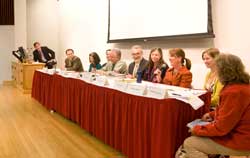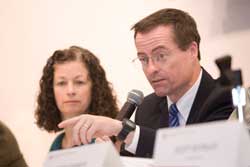Temple University–led summit explores environmental impact of Marcellus Shale drilling
|
Depending on who you talk with, the Marcellus Shale either holds great promise for the future of the U.S. energy industry or potential peril for the natural resources and the communities of Pennsylvania. While it is estimated that the formation contains 500 trillion cubic feet of natural gas that could significantly impact the nation’s energy demands, retrieving that gas could also have a significant impact on the environment, particularly in Pennsylvania. Temple’s department of civil and environmental engineering, through its chair, Michel Boufadel, has begun to marshal its expertise in examining many of the issues surrounding current and proposed drilling throughout Pennsylvania to extract the natural gas trapped within the shale. Earlier this month, Boufadel organized a day-long summit, “Marcellus Natural Gas Stewardship: Understanding the Environmental Impact,” which brought environmental researchers, engineers, geologists, scientists, environmental activists, legal experts, governmental officials and industry representatives together in Walk Auditorium to discuss the geological, environmental and economical impact that drilling in the Marcellus Shale might have on Pennsylvania. It is estimated that each well drilled using hydraulic fracturing--a process which pumps highly pressurized water to break or fracture the shale to extract the gas--will require 1-8 million gallons of water, with much of that water coming back 10-times saltier than seawater. Much of that water will be pulled from the Delaware River basin, which supplies drinking water to Philadelphia, New York and many other communities in Pennsylvania, New York, New Jersey and Delaware. Boufadel said the purpose of the summit was not to determine whether or not the hydraulic fracturing in the Marcellus Shale should be allowed, but to objectively present all sides of the issues associated with natural gas extraction. “We are not living in a world without risk,” he said. “But the risk has to be at a level that’s at an acceptable standard by all those involved, whether it be the state, the energy companies or the communities where the drilling is, and will be, taking place.” Among the Temple experts who presented during the summit were Amy Sinden, a professor in the Beasley School of Law, who discussed the regulation of hydraulic fracturing under the Safe Drinking Water Act; Jeff Featherstone, professor in community and regional planning, who discussed the effect of water withdrawal on water quantity in headwaters; and Boufadel, who discussed the need for a cumulative impact assessment study on the areas surrounding the drilling sites. Boufadel said that working through his Center for Natural Resources Development and Protection, he wants to develop risk maps similar to the flood plain maps Temple developed for the Federal Emergency Management Agency (FEMA) for use in the Pennypack Watershed. “This will allow policy makers and the gas companies to determine the best places to locate the drilling wells,” he said. “Fifty years down the road, someone is going to ask if we did a risk assessment on this drilling and it would behoove us to be able to say, ‘Yes, we did.’” In addition, Temple civil and environmental engineering assistant professors Robert Ryan and Naji Khoury, as well and Temple electrical and computer engineering chair Joseph Picone moderated different parts of the summit. The summit’s highlight was a two-hour panel discussion that included Pennsylvania’s Acting Secretary of Conservation and Natural Resources John Quigley and Pennsylvania’s assistant Southeast Regional Director of Environmental Protection John Kennedy. The discussion was moderated by Pennsylvania State Representative Greg Vitali of Delaware County. |

